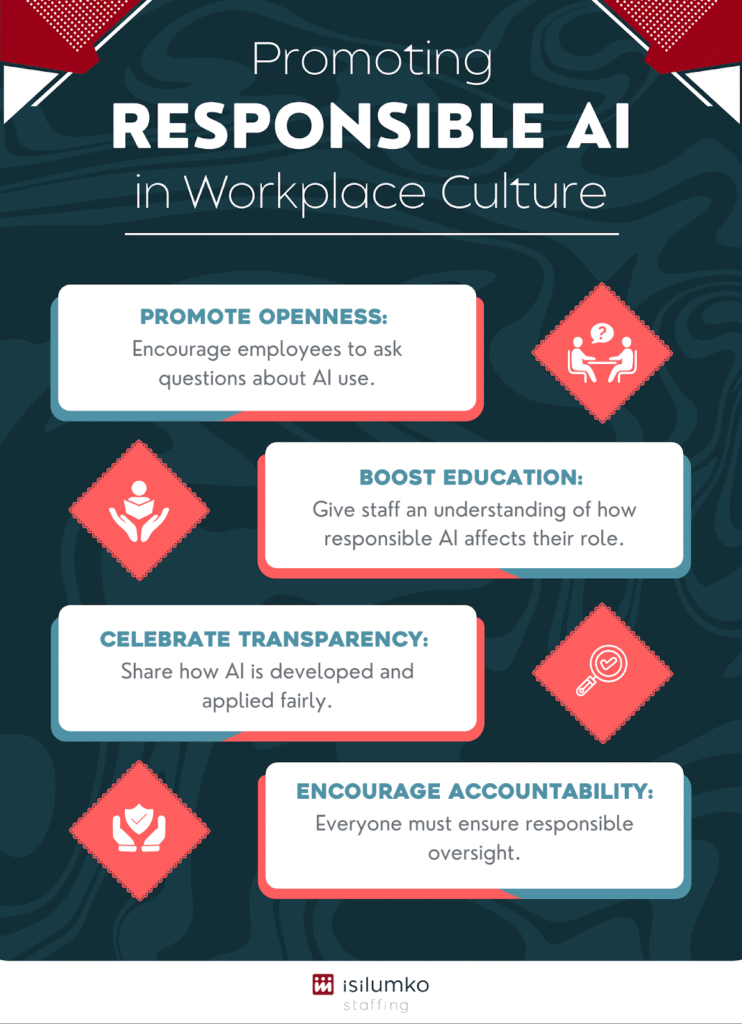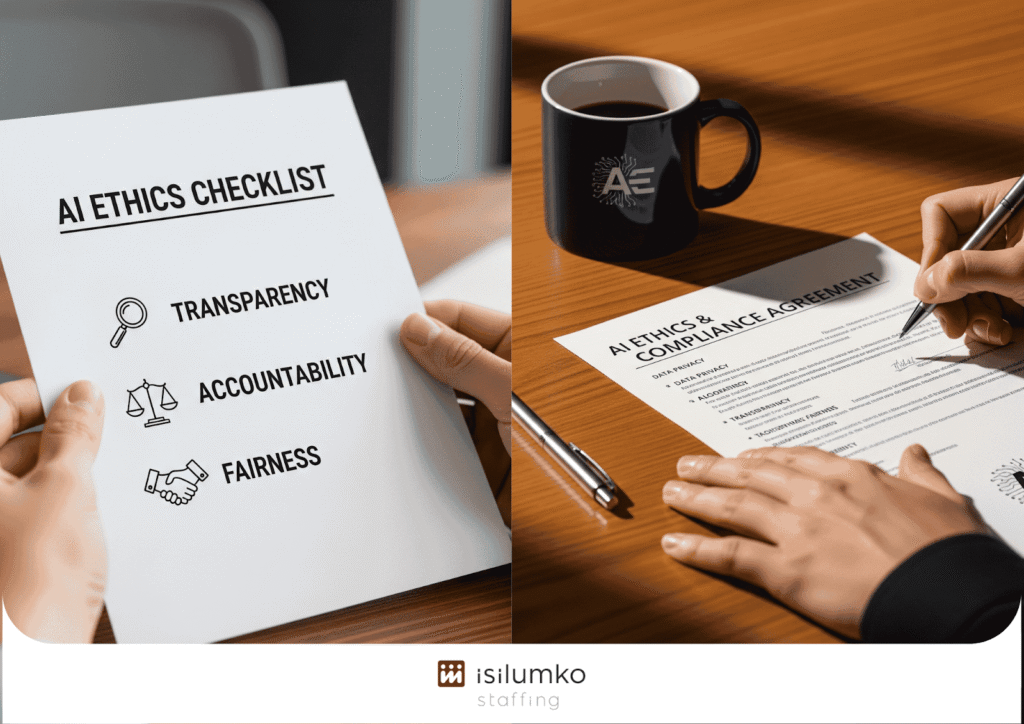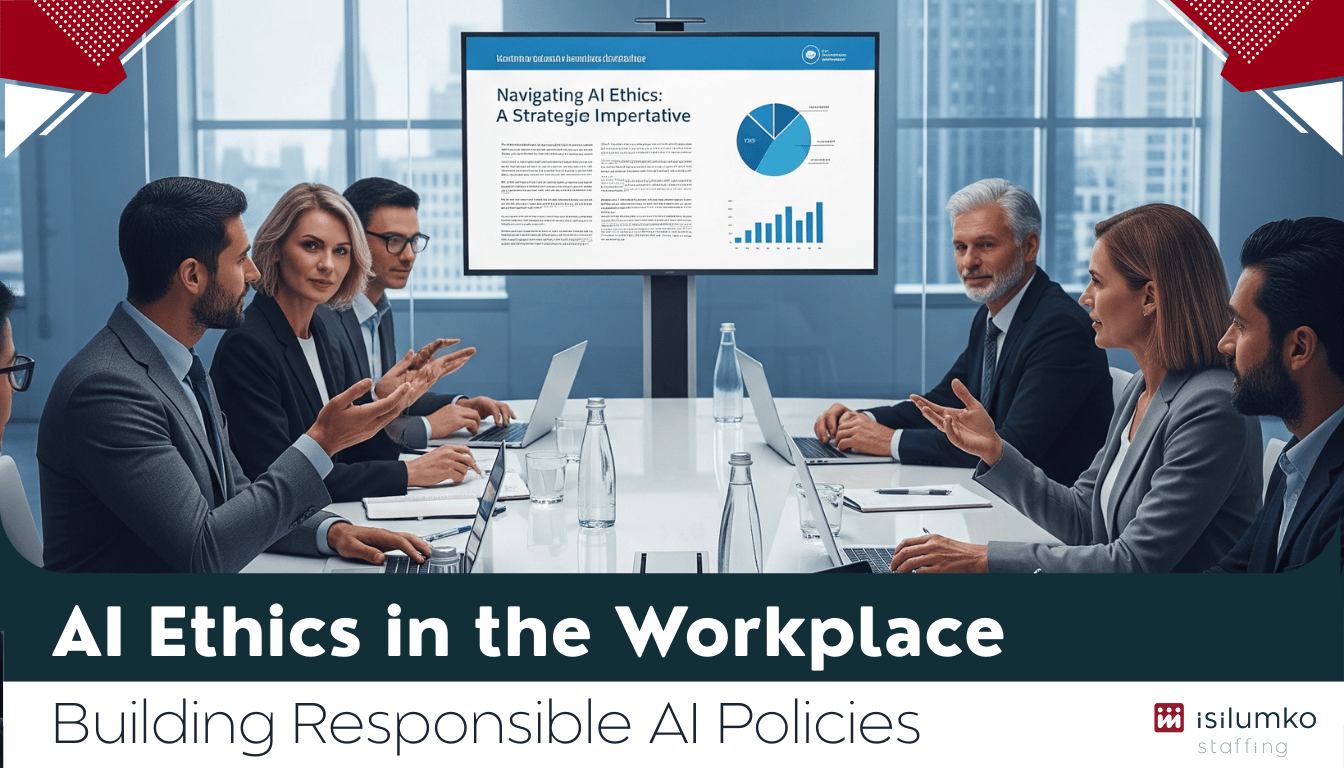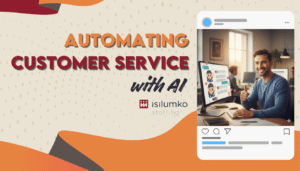AI is transforming how businesses operate, from smarter hiring tools to faster customer service. But with every innovation comes a responsibility: ensuring that AI is being used fairly, transparently, and safely. Without strong AI ethics workplace standards, businesses risk bias, mistrust, and even compliance failures. To navigate these challenges, businesses must implement robust frameworks for measuring AI return on investment. This involves not only evaluating the financial outcomes of AI initiatives but also assessing their societal impact. By prioritizing ethical considerations, companies can build trust with their stakeholders while maximizing the potential benefits of AI technology.
That’s where responsible AI policies step in. They guide companies to use AI responsibly, keeping fairness, accountability, and trust at the center of every decision.
At Isilumko Staffing, a leading South African staffing and recruitment agency with over 30 years of experience, ethical business practices and compliance have always been non-negotiable. Just as they carefully place people into the right roles, they also understand how to integrate AI responsibly into workplace systems.

Understanding AI and Ethics in the Workplace
So, what does AI in the workplace look like?
- Recruitment & Hiring – Using AI systems to screen resumes and match candidates.
- Decision-making – AI algorithms that analyze performance data to guide promotions.
- Customer Service – Chatbots and generative AI tools that respond instantly.
- Operations – Automation of repetitive processes to boost productivity.
Now let’s talk about the ethics of AI. At its core, it’s about:
- Fairness – Avoiding gender bias in artificial intelligence during hiring.
- Transparency – Explaining decisions made by an AI model.
- Accountability – Ensuring that AI systems remain supervised.
Ignoring ethical concerns around privacy or fairness doesn’t just hurt employees—it damages trust and can even violate laws. That’s why ethical AI practices are essential.
Principles of Responsible AI
What do responsible AI principles look like in practice?
- Transparency: Documenting how an AI system works and the data to train the AI.
- Fairness: Ensuring AI algorithms don’t disadvantage certain groups.
- Accountability: Human oversight must ensure that AI works properly.
- Privacy: Protecting sensitive data in every AI project.
Examples of AI use cases in daily operations:
- A company using AI responsibly in candidate screening to remove bias.
- HR departments are developing and using AI systems to match talent fairly.
- Businesses implement AI chatbots for customer queries while logging every conversation.
These are ethical standards that every company can adopt. They form the principles of AI that lead towards responsible AI adoption.
Building a Responsible AI Policy: A Practical Template
Here’s how to start building a responsible AI policy. Think of it as a workplace manual for deploying AI ethically. By establishing clear guidelines and ethical considerations, you can ensure that all employees understand the importance of responsible AI usage. This framework will also facilitate discussions around transparency and accountability when implementing AI in the workplace. Additionally, it’s crucial to provide ongoing training and support to help staff navigate the complexities of AI technologies.
Key Components:
- Ethical considerations: Explicitly ban unfair or biased AI applications in hiring.
- Defined AI use: Clear rules for the use of AI in customer interactions.
- Oversight: Regular audits for every deployment of AI systems.
- Transparency measures: Explain how an AI model reached its decision.
- Education: Train staff to use AI responsibly and safely.
Sample wording:
“Our organization is committed to promoting responsible AI by implementing policies that reduce risk, improve transparency, and ensure AI is developed and used ethically. We will monitor every AI system to ensure that AI systems to ensure fairness, security, and compliance.”
Implementing Responsible AI Practices
Once your AI policy is in place, it’s time to act.
- Start small: Run a pilot AI project.
- Test thoroughly: Review all AI processes for accuracy.
- Educate staff: Help employees gain an understanding of AI.
- Document decisions: Keep logs for every decision made by an AI system.
Successful examples include global brands that adopt responsible AI frameworks. Locally, companies like Isilumko Staffing apply strict compliance and diversity checks, ensuring the responsible use of AI in candidate sourcing.
Here’s a commitment to responsible AI statement you can adapt:
“We commit to implementing responsible AI and ethical practices that build trust, protect privacy, and deliver fair outcomes throughout the development and deployment of AI.”
Promoting Responsible AI in Workplace Culture

Ethics and AI: Addressing Key Concerns
Some of the most pressing ethical concerns include:
- Privacy: Protecting sensitive employee data during AI development and use.
- Fairness: Preventing bias when AI is developed and used in hiring.
- Job security: Addressing fears that AI may replace workers.
Generative AI introduces new opportunities—like automated reporting—but also risks, such as misinformation. That’s why trustworthy AI and ethical guidelines matter.
To build trustworthy AI, companies must:
- Ensure that AI systems are monitored.
- Must ensure AI decisions are explainable.
- Apply principles for AI that focus on fairness.
These practices safeguard both employees and clients while following the ethics of artificial intelligence.
How This Business Stands Out
Compared to competitors, Isilumko Staffing stands out with its strong AI governance mindset. They balance innovation with strict compliance, making them a best fit for companies aiming to adopt responsible AI practices.
Top reasons to choose Isilumko Staffing:
- Proven experience: Over 30 years in staffing and compliance.
- Ethical AI approach: Committed to responsible AI development.
- Transparency: Clear communication about how AI is developed and used.
- Credible reputation: Listed in global AI and staffing directories.
- Client trust: Backed by testimonials and case studies that build trust.
They show how responsible AI represents a future-ready staffing model, fully aligned with responsible artificial intelligence expectations.
Building Trust Through Reputation
Trust comes from transparency and proof.
- Case studies: Showing real AI use cases that improved recruitment.
- Testimonials: Clients praising fairness and efficiency.
- FAQs: Explaining AI technologies and AI tools clearly.
- Pricing pages: Transparent about costs when AI is developed for clients.
Isilumko Staffing has been recognized in credible directories, rated highly by clients, and praised for fair AI and compliance. These trust signals prove their commitment to responsible AI and highlight their leadership in responsible AI use.

Future-Proofing with Responsible AI
The message is clear: as AI becomes more integrated into business, companies must adopt responsible AI principles. Strong ,responsible AI policies protect against risks, boost efficiency, and ensure AI is developed with fairness and accountability.
From deploying artificial intelligence in hiring to ensuring compliance in staffing, the responsible use of AI isn’t optional—it’s essential. Companies must ensure that AI systems are fair, transparent, and compliant throughout the AI lifecycle. Moreover, as organizations increasingly adopt ai tools for workplace efficiency, they must prioritize ethical considerations to avoid biases that could lead to discrimination. Ongoing monitoring and evaluation of AI systems are crucial for maintaining accountability and trust. By fostering a culture of responsible AI usage, companies can leverage these technologies to enhance productivity while safeguarding employee rights.
Responsible AI is the practice that keeps businesses future-ready. By adopting responsible AI today, organizations protect reputation, compliance, and most importantly, trust.
Ready to take the next step? Contact Isilumko Staffing to discover how their expertise and responsible AI practices can help your workplace embrace innovation with confidence. Visit the contact page and connect with their team today—they’ll guide you towards responsible AI adoption tailored to your needs.




